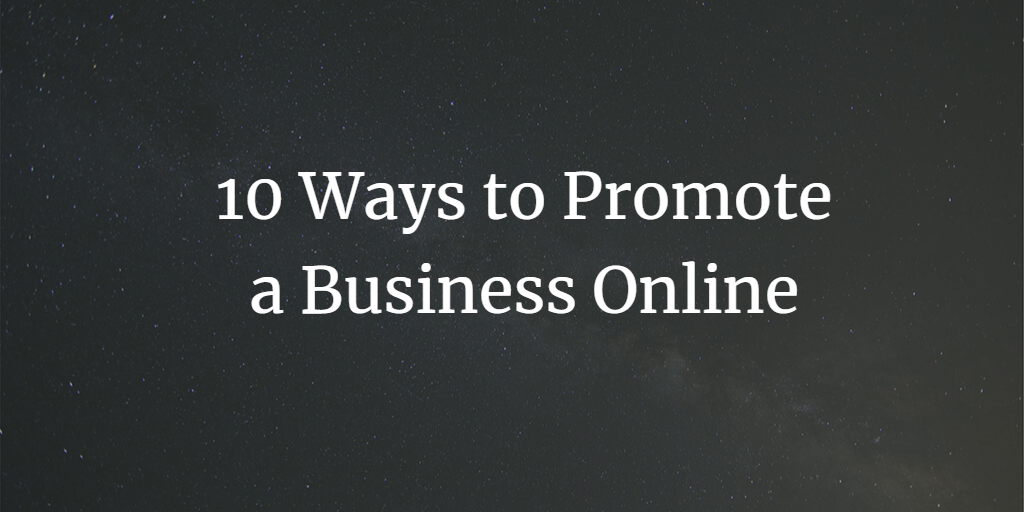10 Ways to Promote a Business Online

Table of Contents
Introduction
1. SEO (Search Engine Optimization)
2. Content Marketing
3. Social Media Marketing
4. Email Marketing
5. Influencer Marketing
6. PPC (Pay-Per-Click) Advertising
7. Affiliate Marketing
8. Online PR
9. Webinars
10. Collaborations and Partnerships
Conclusion
Introduction
The digital age has reshaped the business landscape, providing numerous opportunities to reach and engage with potential customers. Promoting a business online has become a necessity for companies seeking growth and success in today's competitive environment.
This post will guide you through the top 10 ways to promote a business online in 2023, providing valuable insights into strategies that can enhance your online presence, connect with your target audience, and drive business growth.
1. SEO (Search Engine Optimization)
Search Engine Optimization (SEO) stands as an indispensable digital marketing strategy. It involves optimizing your website's content, layout, and design to improve its visibility on search engines. Higher visibility equates to more organic traffic, leading to increased opportunities for conversions and sales.
SEO not only involves keywords but also website structure, page speed, mobile-friendliness, and backlinks. Tools like Google Analytics, SEMrush, and Ahrefs can help you track your SEO efforts and understand the behavior of your website visitors. Remember, SEO is a long-term strategy, but the results are well worth the investment.
Think of SEO as a form of organic digital marketing. It is about refining your website and its content to align with what your potential customers are searching for on search engines. But beyond that, it is also about providing a positive user experience. For instance, a fast-loading, easily navigable website is more likely to retain a visitor's interest.
Always keep abreast of the frequent changes in search engine algorithms. A strategy that worked a few months ago may not necessarily work today. Engaging an SEO professional or agency, attending SEO webinars, or taking SEO courses can all help stay up to date with the latest SEO trends and strategies.
2. Content Marketing
Content marketing involves creating and sharing valuable content to attract, engage, and convert your audience. This strategy is effective in building trust and rapport with your audience. Blogs, videos, infographics, case studies, and podcasts are all forms of content that can be utilized.
To stand out in the crowded digital space, your content needs to be valuable, engaging, and shareable. This involves understanding your audience's pain points and providing solutions through your content. The use of keyword research tools can be helpful to discover what your target audience is searching for.
Content marketing extends beyond the mere creation of blog posts or articles. It also includes videos, podcasts, webinars, ebooks, infographics, case studies, and more. Diversifying your content formats can help reach a wider audience as different people have different content preferences.
Understanding your customer's journey and aligning your content with each stage of the journey can increase its effectiveness. A visitor at the awareness stage might be more interested in an educational blog post, while a potential customer at the decision stage might find a case study or a product comparison more useful.
3. Social Media Marketing
Social media platforms offer a cost-effective way to reach a vast audience. Regularly posting engaging content on platforms where your audience spends time can boost your visibility and foster a community around your brand.
Consistency is key in social media marketing. Having a content calendar can help you maintain a regular posting schedule. Engaging with your followers, responding to their comments, and listening to their feedback can help in building a loyal community. Each social platform has its unique features and audience, understanding these nuances can significantly increase your marketing effectiveness.
Given the multitude of social media platforms available, it can be challenging to maintain a presence on all of them. Choose the platforms that are most popular among your target audience and focus your efforts on those.
Regularly assess your social media performance. Are your posts getting likes and shares? Are your followers leaving comments? These metrics can provide insights into what kind of content resonates with your audience.
4. Email Marketing
Despite the proliferation of social media platforms, email remains one of the most effective marketing channels. It allows you to directly reach your audience with personalized messages, promoting products or services and offering customer support.
Segmentation and personalization are two critical aspects of effective email marketing. Not all subscribers have the same interests or are at the same stage in the customer journey. Therefore, sending personalized emails based on their interests and behavior can significantly increase engagement.
Remember that people receive dozens of emails every day. Make your emails stand out by crafting compelling subject lines and providing valuable content. Ensure that your subscribers always have the choice to unsubscribe. Bombarding people with unwanted emails can harm your brand reputation.
5. Influencer Marketing
Influencer marketing involves partnering with individuals who have a significant following or influence in your industry. These influencers can promote your products or services to their audience, which can lead to increased brand awareness and potentially boost sales.
Finding the right influencer is crucial. They should align with your brand values and have an audience that matches your target demographic. Micro-influencers, although having smaller followings, often have highly engaged audiences and can sometimes be more effective than mega-influencers.
Working with an influencer doesn't mean you give them a script to follow. Let them use your product or service and share their genuine experience with their followers. Their authenticity is what makes their followers trust their recommendations.
6. PPC (Pay-Per-Click) Advertising
Pay-Per-Click (PPC) advertising is a model of internet marketing where advertisers pay a fee each time one of their ads is clicked. This paid form of traffic is a great way to drive a targeted audience to your website. The most popular PPC advertising platform is Google Ads, followed by Bing Ads and social media advertising platforms.
A successful PPC campaign requires thorough keyword research, compelling ad copy, and an optimized landing page. The campaign should be monitored regularly, and adjustments made based on performance. An effectively managed PPC campaign can result in increased traffic and conversions.
Consider hiring a PPC specialist or agency, especially if you have a sizable budget. Managing a PPC campaign can be complex and time-consuming, and a specialist can help optimize your campaign to get the most out of your investment.
7. Affiliate Marketing
Affiliate marketing allows other people or businesses to promote your products and receive a commission for any sales they make. This form of marketing can be beneficial as it spreads the work of promoting products across a larger network.
For a successful affiliate marketing program, provide your affiliates with all the necessary promotional materials, such as banners, sample posts, or email copy. Regularly updating these materials and offering incentives for top-performing affiliates can further enhance your program's success.
Affiliate marketing is all about relationships. Nurture your relationships with your affiliates. Regularly communicate with them and offer support as needed. Their success is your success.
8. Online PR
Online Public Relations (PR) includes activities geared towards improving your online presence and reputation. This could be through press releases, creating relationships with bloggers and influencers, responding to customer reviews, or engaging on social media. It's a way to control the narrative about your business online.
Just as with traditional PR, building relationships is key in online PR. These relationships can be with journalists, bloggers, or influencers in your industry. Regularly reach out to them with useful information or exclusive news. Tools such as HARO (Help A Reporter Out) can connect you with journalists looking for expert sources.
In online PR, focus on building genuine, long-term relationships with media personalities. Rather than reaching out only when you need something, try to offer them something of value as well.
9. Webinars
Webinars are live, online educational presentations where participants can interact with the host. They can be a fantastic way to demonstrate your expertise, promote your brand, and connect with potential customers. You can promote new products, provide training, or even invite guest speakers.
Webinars can position your brand as an authority in your industry. Promote your webinars through all your marketing channels to increase attendance. Recording the webinar and offering it as evergreen content can continue to drive leads even after the event has ended.
The success of a webinar often lies in its promotion. Start promoting your webinar well in advance, and use a multi-channel approach to reach as many people as possible.
10. Collaborations and Partnerships
Strategic collaborations and partnerships with other businesses can provide mutual benefits. Co-hosting events, sharing blog posts, or offering bundle deals with complementary products or services can attract a new audience and increase brand exposure.
Collaborating with a business that offers complementary products or services can provide mutual benefits. It's like doubling your marketing efforts without doubling your marketing budget. Make sure to choose a partner whose business aligns with yours in terms of values, goals, and target audience.
By understanding and effectively implementing these strategies, you can promote your business online and reach a wider audience. Keep testing, learning, and adapting, and your online presence will continue to grow.
Collaborations and partnerships can be an excellent way to reach new audiences. However, be cautious when choosing a partner. Make sure their brand aligns with yours and that their audience would be interested in what you have to offer.
While each of these strategies can be effective, using them in combination can be even more powerful. Your social media marketing can support your content marketing efforts, while your SEO strategies can increase your website's visibility and drive more traffic to your site. Ultimately, a well-rounded, integrated approach to online promotion can yield the best results.
Conclusion
Promoting a business online involves a mix of strategies tailored to your target audience and business goals. By leveraging the power of SEO, content marketing, social media, email marketing, and other digital tools, you can propel your business growth and reach your desired audience. Experiment, analyze results, and continually optimize your strategy to achieve the best results.
Remember, there's no one-size-fits-all approach when it comes to online promotion. What proves effective for one business may not yield the same results for another. It's about finding the right balance for your unique business needs and goals. Embrace the journey, learn from each experience, and watch your business thrive.
The digital landscape is constantly evolving, providing businesses with new and exciting opportunities. Stay updated, remain flexible, and continue to evolve your digital strategy to remain competitive. Here's to your online success!


